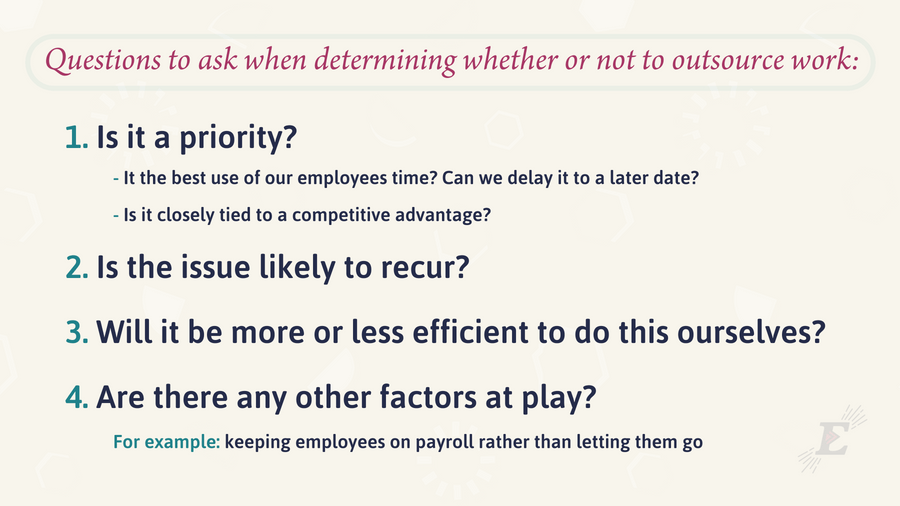When To Invest In The Right HR Resources As Your Organization Is Growing
As a growing company, one of the many challenges you’ll face in your capacity as a leader, HR professional – or really any member of the organization tasked with making this call – is deciding whether or not to seek outside help on a project, and when. After you’ve determined you do need to hire someone, you’re then faced with deciding on who.
These are definitely not a trivial set of decisions considering that any investment made can be quite the risky venture. But fear not, we’re here to help.
We know that tackling the variables at play can be daunting, so this week, we thought we’d organize them for you into some bite-sized, easy-to-digest pieces. We’ll dissect the pros of hiring consultants, introduce a handy checklist for figuring out whether or not to do so, and share some tips on how to decide who to hire. And we’ll close out by sharing some friendly words of caution 🙂 Hopefully, the next time you find yourself making these decisions, you’ll have more confidence knowing you made the right ones!
BUT FIRST… SNAG YOUR FREE HR DECISION TREE TEMPLATE!
Alright, let’s dive in.
First off, there can be many upsides to bringing in outside help. Here are some examples of what’s to gain:
- A fresh set of eyes. Sometimes, you’re too close to a problem to be able to identify it. An outside perspective can offer a new lens and help you see what you and your colleagues may have been blind to.
- Knowledge. Most consultants can speak from a range of experience working with other companies, and on pain points that can be very similar to the ones you’re now going through. They can serve as a valuable resource as the best practices they’ve gathered from across your industry can help inform your decisions.
- A catalyst for change. Sometimes you already have a solution, and you’re just having a hard time convincing others of its merits. A prestigious consultant can serve as the objective, political power you need to get your colleagues on board.
- An unbiased, objective point of view. As a leader, it can be difficult to create an atmosphere where employees feel they can be completely honest with you. Consultants on the other hand typically have no vested interest in the relationship and can point out what others felt they couldn’t.
- Surge support. If you don’t have the manpower or internal resources for a one-off project, and it just doesn’t make sense to re-prioritize your employees’ core responsibilities – consultants can lend a hand.
- Subject matter expertise. If you don’t have the specialized talent or skill needed in-house, turn to experts that do.
- A mediator. When you’ve got a controversial project on your hands that has the potential to affect employee morale, or a sensitive issue best handled by an independent third party (think layoffs or restructures), consultants serve as the logical alternative.
Now that we’ve covered the ways in which consultants can be of help, let’s talk about how to decide when to go ahead and hire one. Spend some time gathering the information you need to answer the following questions and focus on the variables that influence them. Here they are:
Question #1: Can We Handle This Project On Our Own?
For some situations, it may make sense to leverage your in-house human resources team. But in others, not so much… here are 4 factors to consider:
-
- Expertise – is it a core competency?
- Sensitivity – are there cultural or political dynamics at play that may harm the outcome’s integrity?
- Time – do we have it?
- Manpower – are our employees available?
So if you feel you may be lacking the expertise, time, or manpower, or that the content of the project may be a little t00 sensitive to be handled by your own employees, its probably best to hire an outside consultant.
Question #2: Should Handle This Project On Our Own?
So many things to do, so little time. At Energize Leadership, we believe in being intentional and smart about how we spend our time.
When scoping out a project, ask yourself the following questions:

Answering these questions will help you hone in on whether you have the capability, and the capacity to take the project on internally, or whether to seek outside help.
It is not enough to be busy. So are the ants. The question is: What are we busy about? - Henry David Thoreau Share on XNext Steps
If and when you do decide that hiring a consultant is the way to go, keep in mind a couple of things to inform who you end up contracting with:
- Size. Remember that a smaller, “closer-to-home” consultant can come with the benefit of a chance for personal relationships. Cultivating this connection can pay in dividends as the consultant you partner with consistently gains insight into your organization – your culture, your employees, your goals, and so on. The more context they have, the better they can serve you in any future engagements.
- Track record. Use a consultant’s client-base and project history as clues to judge their potential on being a good fit with you. Is your project industry specific? Maybe you’re entering a new market, like healthcare, and it just doesn’t make sense to partner with a consultant that has had more clients/projects in the tech space. Make a choice informed by their credibility and experience in your competitive arena.
A word to the wise…
Remember that regardless of your project needs and who you end up partnering with, all consultants ultimately need your help to make it a successful partnership, and you will be the bearer of any successes or failures in the outcome. A common mistake made by companies is to become over-reliant on consultants and not contributing to or managing the process. Keep in mind, good consultants are looking for partnerships because they know this is what will bring the best return on your investment. Be sure you pick consulting teams you can truly partner with, and don’t hire them unless you know you have the bandwidth to support the partnership.




